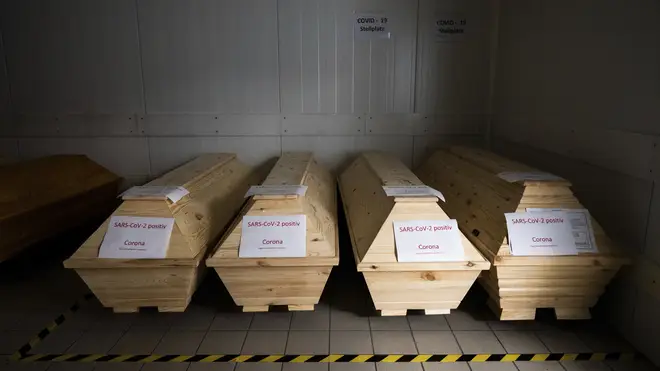
Shelagh Fogarty 1pm - 4pm
25 November 2021, 17:24

The country’s health minister has said rising cases mean everyone who is not vaccinated will have caught the virus by winter’s end.
Germany has become the latest country to pass the milestone of 100,000 deaths from Covid-19 since the pandemic began.
The disease control agency said it recorded 351 additional deaths in connection with coronavirus over the past 24 hours, taking the overall toll to 100,119.
Germany is the fifth country to pass that mark in the Europe region after Russia, the UK, Italy and France.

It comes days after Germany’s health minister said the rapid rise in coronavirus cases means it is likely that everyone in the country who is not vaccinated will have caught Covid-19 by the end of the winter, and some of those will die.
Chancellor Angela Merkel said at a press conference: “It is of course a very sad day that we have to mourn 100,000 victims of the coronavirus. And unfortunately, at the moment, more than 300 deaths are being added to that each day.”
The long-time German leader, who is in office as caretaker until her successor is sworn in, warned that hundreds more deaths were already looming.
“(The deaths) correlate very clearly with the number of infections that are occurring,” she said. “We know how many people on average do not survive this disease.

“The situation is so serious because we are still in an exponential growth and because the cases that we see getting sick today are basically the patients who will be in intensive care in 10 or 14 days.”
The Robert Koch Institute, a federal agency that collects data from hundreds of regional health offices, said Germany also recorded a new record number of daily confirmed cases — 75,961 in a 24-hour period.
Since the start of the outbreak, Germany has had more than 5.57 million confirmed cases of Covid-19.
The surge in cases prompted Germany’s government-in-waiting on Wednesday to announce the creation of a new permanent expert group to advise officials on how to tackle the pandemic.
Hospitals have warned that intensive care beds are running out, and some facilities in the country’s south and east have begun transferring patients to other regions.

Meanwhile, France has launched a plan to give booster jabs to all adults, as it opted against a further lockdown or curfew to help combat an increase in infections, with daily new cases rising above 30,000.
Health minister Olivier Veran announced a reduction in the time gap between second and third jabs from six to five months. He said France has enough vaccines to launch the nationwide booster campaign.
He also laid out a range of measures, including tightening the use of masks in public areas, and said a Covid pass required in many indoor places across the country will become invalid if a person has not received a booster jab within seven months of a second dose.
He said there are 10 times more unvaccinated people in hospital because of the virus than vaccinated ones, adding that without the vaccine the country would already be in lockdown.
Elsewhere, the Czech government declared a 30-day state of emergency and imposed additional coronavirus restrictions in its effort to tackle a record surge of infections.
The state of emergency comes into effect on Friday and is a powerful legal tool that makes it possible to restrict people’s rights.
Among the other measures, all Christmas markets are banned and drinking alcohol in public places is also forbidden, health minister Adam Vojtech said.
Bars, restaurants, nightclubs, discos and casinos have to close at 10pm, and the number of people at cultural and sports events will be limited to 1,000 who are vaccinated or have recovered from Covid-19.
All other public gatherings can be attended by up to 100 visitors, down from 1,000.